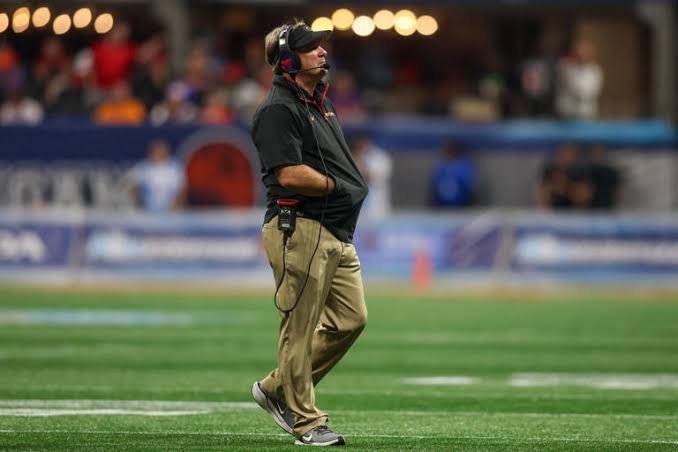SHOCKING NEWS: Kirby Smart Leads Georgia to SEC Championship, but Announces Controversial Stand Amidst Record-Breaking Season
The University of Georgia Bulldogs are in the midst of a historic season, as head coach Kirby Smart has guided the team to yet another SEC Championship title. The victory, which came in a thrilling game against a highly competitive opponent, solidified Georgia’s dominance in college football under Smart’s leadership. However, amidst the celebration, Smart has made a surprising and controversial announcement that has left fans, analysts, and players alike questioning the future direction of the program.
The 2024 SEC Championship was a testament to Smart’s coaching brilliance and the Bulldogs’ relentless drive. Georgia, with a powerful roster featuring standout players on both sides of the ball, defeated their rivals in what has been dubbed one of the most intense championship games in recent years. The victory marks Smart’s fourth SEC title with Georgia, continuing his legacy of success since taking the helm in 2016.
This year’s Bulldogs team is widely regarded as one of the best college football teams of the decade. With a top-ranked defense and a high-powered offense, Georgia has looked nearly unstoppable throughout the season. Quarterback Carson Beck, along with the team’s stellar running back committee, led the offense to new heights, while the defense, anchored by players like linebacker Jamon Dumas-Johnson, has been suffocating. The team’s performance has been nothing short of dominant, with a perfect regular season record heading into the SEC Championship.
However, following the monumental win, Smart stunned the sports world with an unexpected statement during the post-game press conference. In a bold move that many are still processing, Smart announced that he intends to challenge longstanding NCAA regulations regarding player compensation. Specifically, Smart voiced his support for the idea of players receiving a larger share of the financial rewards generated by their athletic abilities. The move comes amid increasing pressure for college sports to shift its focus towards a more equitable compensation model for student-athletes.
“I believe it’s time for college football to evolve,” Smart said in his remarks. “The athletes who are the driving force behind the success of these programs deserve more. We need to re-evaluate how we approach compensation in college sports because it’s not just about winning championships anymore. It’s about fairness, equality, and ensuring that players are properly compensated for their efforts.”
Smart’s statement has sent shockwaves through the college football world, where NCAA rules still prohibit athletes from receiving direct payments beyond scholarships and other limited allowances. In recent years, there has been growing momentum towards changing this model, especially with the rise of the NIL (Name, Image, and Likeness) rights, which allow players to profit from their personal brand. However, Smart’s stance goes even further, advocating for a redistribution of the enormous revenue generated by major college football programs.
Critics of Smart’s position argue that such a move could destabilize the college sports landscape. Many believe that allowing college athletes to receive a significant portion of the revenue could lead to an even greater disparity between the wealthiest programs and those with fewer financial resources. Some fear it could result in the erosion of the traditional student-athlete experience, where athletes balance both academics and sports, without the full pressures of professional contracts.
On the other hand, Smart’s supporters argue that the current system is outdated and that players are often exploited by the multi-billion-dollar college football industry. With top programs like Georgia generating millions of dollars each year through ticket sales, media deals, and merchandise, the calls for a more equitable system have grown louder. Supporters contend that players, who risk injury and invest countless hours into training and competition, should be entitled to a larger share of the financial success they help create.
In the aftermath of Smart’s announcement, the controversy has intensified. Alumni, current players, and even high school recruits are now considering how this shift in philosophy could affect their futures. Some believe that Smart’s bold stance will prompt other head coaches to follow suit, sparking a nationwide movement towards player compensation reform. Others worry that it could create friction between athletic programs, especially those that are not financially equipped to meet these new demands.


